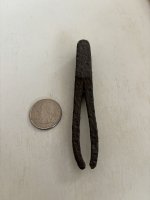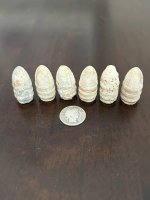Hi
I am Bill Lionheart and I am a professor of applied mathematics. One of the things I work on is the theory of locating conducting objects with inductive measurements.
I did actually go metal detecting when I was a kid in the 1970s, a friend of my father took us and he was very experienced. He was very pleased that his best find was an Elizabeth I silver shilling and he had fired our enthusiasm. The first time I tried it I found my own Elizabeth I silver shilling! But there my experience ended.
Professionally we made a system that images molten steel in a ceramic pipe using multiple coils. We applied a similar idea to make an improved walk-through security metal detector, again driving and measuring multiple coils. This system locate several metal objects and superimposes a marker for the metal object on a video of the person. We also went on not just to locate the object but characterize it with a thing called a polarization tensor - you can think of this as a sort of best fitting ellipsoid. From this you can see if the object is flat like a coin or long like a knife.
We then turned our attention to land mine detection and we are working towards "imaging" metal detectors that will locate and characterize metal objects with multiple coils and trying to integrate this with Ground Penetrating Radar for less conductive objects (plastic mines have a small bit of metal in them). I am just on the way back from visiting a mine field in Cambodia to understand field conditions.
If anyone is interested in the theory this paper is freely available Understanding the magnetic polarizability tensor - IEEE Xplore Document
So the reason I joined this forum is that I thought there must be a wealth of experience of the practicalities and usabilities of metal detectors in the treasure hunting community (if that is the right name - I think maybe in the UK the hobby is just called metal detecting). Like deminers I expect you mainly dig up lots of "false positives" of metal junk. I also wondered if there might be a use for the sort of technology we are working on for the hobby market. If so it might bring down development costs for demining.
I am in a strange position of knowing a lot about a little - I know about things I worked on but very little about the history or development or use of metal detectors (of course my engineering colleagues know much more).
I am Bill Lionheart and I am a professor of applied mathematics. One of the things I work on is the theory of locating conducting objects with inductive measurements.
I did actually go metal detecting when I was a kid in the 1970s, a friend of my father took us and he was very experienced. He was very pleased that his best find was an Elizabeth I silver shilling and he had fired our enthusiasm. The first time I tried it I found my own Elizabeth I silver shilling! But there my experience ended.
Professionally we made a system that images molten steel in a ceramic pipe using multiple coils. We applied a similar idea to make an improved walk-through security metal detector, again driving and measuring multiple coils. This system locate several metal objects and superimposes a marker for the metal object on a video of the person. We also went on not just to locate the object but characterize it with a thing called a polarization tensor - you can think of this as a sort of best fitting ellipsoid. From this you can see if the object is flat like a coin or long like a knife.
We then turned our attention to land mine detection and we are working towards "imaging" metal detectors that will locate and characterize metal objects with multiple coils and trying to integrate this with Ground Penetrating Radar for less conductive objects (plastic mines have a small bit of metal in them). I am just on the way back from visiting a mine field in Cambodia to understand field conditions.
If anyone is interested in the theory this paper is freely available Understanding the magnetic polarizability tensor - IEEE Xplore Document
So the reason I joined this forum is that I thought there must be a wealth of experience of the practicalities and usabilities of metal detectors in the treasure hunting community (if that is the right name - I think maybe in the UK the hobby is just called metal detecting). Like deminers I expect you mainly dig up lots of "false positives" of metal junk. I also wondered if there might be a use for the sort of technology we are working on for the hobby market. If so it might bring down development costs for demining.
I am in a strange position of knowing a lot about a little - I know about things I worked on but very little about the history or development or use of metal detectors (of course my engineering colleagues know much more).






